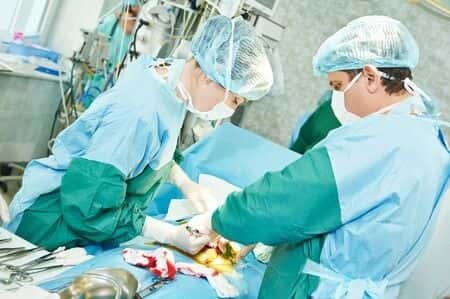General Surgery Expert Discusses Multiple Errors in Laparoscopic Cholecystectomy Procedure
Updated on
Case Overview
This case involves a 55-year-old male who presented to the hospital with classic symptoms of chronic and acute gallbladder dysfunction. Ultrasound confirmed the presence of several gallstones and gallbladder thickening. The attending surgeon insisted that a hepatobiliary (HIDA scan study be performed, which confirmed acute cholecystitis, and during which the patient had a severe reaction to Cholecystokinin infusion (CCK. The patient proceeded to laparoscopic cholecystectomy. It was later determined that during the laparoscopic cholecystectomy procedure, the surgeon had cross clamped the patient’s common bile duct (CBD, and it had begun leaking bile internally. His hospitalization lasted for several weeks, including admission to the ICU and the development of sepsis. The leak was eventually controlled via stenting during endoscopic retrograde cholangiopancreatography (ERCP. The patient began a series of ERCP stent exchanges in an attempt to expand the now badly constricted CBD. Months later, during another ERCP procedure, the CBD was ruptured, and he began internally leaking bile once again. Hospitalization lasted several more weeks, during which time the patient developed a vancomycin-resistant enterococci (VRE infection. Upon release, a Hepaticojejunostomy was scheduled. That open procedure was performed and the surgeon found not only a severely strictured CBD, but the severe stricture extended up into the hepatic ducts. Drainage out of one of the hepatic ducts never returned to normal during the course of his followup treatment and removal of the biliary drains.
Questions to the General Surgery expert and their responses
Do you routinely perform laparoscopic cholecystectomy procedures?
I routinely perform laparoscopic cholecystectomy on both an elective and urgent basis.
Have you ever had a patient develop the complications noted above?
I have never had a patient with a delayed laparoscopic common bile duct injury. I have had difficult dissections and immediate diagnosis of minor bile duct injuries. I have managed many cystic duct stump and bile duct leaks.
What steps must be taken to ensure this outcome never occurs?
To ensure this outcome does not occur, the following should be taken into account: careful surgical technique, intraoperative cholangiography, and close patient follow up with early identification of complications. I would've also considered delayed operative management after failed ERCP with percutaneous transhepatic biliary drain placement.
About the expert
This board certified surgeon earned his MD from the University of Texas Health Science Center in San Antonio, and completed internship and residency training in general surgery at Texas A&M University. As a member of the US Army Reserves, this expert did two tours in Iraq as a Trauma Surgeon and was awarded an Army Commendation Medal during each tour. This expert's professional memberships include: the prestigious Texas Surgical Society, the Society of Gastrointestinal and Endoscopic Surgeons, the American Medical Association, the Texas Medical Association, and the Midland County Medical Society. Throughout his career, this expert has held numerous surgical positions at various hospitals. Currently, he is the medical director of multiple medical facilities in Texas and a Clinical Assistant Professor of Surgery at a top university medical center.

E-009842
Specialties:
About the author
Joseph O'Neill
Joe has extensive experience in online journalism and technical writing across a range of legal topics, including personal injury, meidcal malpractice, mass torts, consumer litigation, commercial litigation, and more. Joe spent close to six years working at Expert Institute, finishing up his role here as Director of Marketing. He has considerable knowledge across an array of legal topics pertaining to expert witnesses. Currently, Joe servces as Owner and Demand Generation Consultant at LightSail Consulting.
Subscribe to our newsletter
Join our newsletter to stay up to date on legal news, insights and product updates from Expert Institute.
Sign up nowFind an expert witness near you
What State is your case in?
Subscribe to our newsletter
Join our newsletter to stay up to date on legal news, insights and product updates from Expert Institute.



